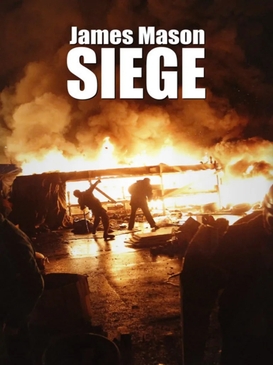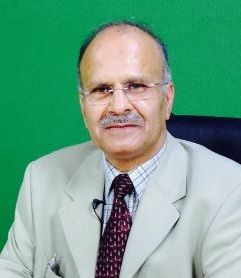
India–Pakistan relations are the bilateral ties between the Republic of India and the Islamic Republic of Pakistan. The two countries have a complex and largely hostile relationship that is rooted in a multitude of historical and political events, most notably the partition of British India in August 1947. The India–Pakistan border is one of the most militarised international boundaries in the world. Northern India and most of modern-day Pakistan overlap with each other in terms of their common Indo-Aryan demographic, natively speaking a variety of Indo-Aryan languages.
Muslim Aid is a UK based Islamic International Non-Governmental Organization (INGO). The international humanitarian charity has relief and development programmes in countries across Africa, Asia, and Europe. It is the second oldest Muslim charity in the UK and celebrated its 35th anniversary in 2020. The charity works to support and empower people suffering the effects of poverty, war, and natural disaster through both emergency relief and sustainable programmes designed to provide long-term support and independent futures to the most vulnerable communities around the world. The charity is a long standing member of a number of umbrella organisations including BOND, NCVO and is one of the founding members of the Muslim Charities Forum. Traditionally supported by its local communities, it has established partnerships with major institutional funders around the world including the UN World Food Programme (WFP), The UN Refugee Agency, DFID, European Commission (ECHO) and others. It is the UK's second oldest Muslim charity.

Harkat-ul-Jihad-al-Islami is a Pakistani Islamic fundamentalist Jihadist organisation affiliated with Al-Qaeda and Taliban. Which aims to spread Radical Islamist ideology to liberate the rest of Islamic lands from the clutches of the enemies of Islam.

H.A. Hellyer is a British scholar and analyst. He writes on the politics of the modern Middle East and North Africa, faith and politics in Europe and internationally, majority-minority relations, security issues and the Muslim world–West relations. He is a scholar at the Carnegie Endowment for International Peace, and a fellow of Cambridge University's Centre for Islamic Studies. Previously, he was a senior nonresident fellow at the Atlantic Council's Center for the Middle East, and associate fellow at the Royal United Services Institute. Previously a nonresident fellow at the Brookings Institution's Foreign Policy section, and he was also Democracy Non-Resident Fellow for the academic year 2014 to 2015 at the John F. Kennedy School of Government of Harvard University.
Radicalization is the process by which an individual or a group comes to adopt increasingly radical views in opposition to a political, social, or religious status quo. The ideas of society at large shape the outcomes of radicalization. Radicalization can result in both violent and nonviolent action – academic literature focuses on radicalization into violent extremism (RVE) or radicalisation leading to acts of terrorism. Multiple separate pathways can promote the process of radicalization, which can be independent but are usually mutually reinforcing.

The Institute for Strategic Dialogue (ISD) is a think tank founded in 2006 by Sasha Havlicek and George Weidenfeld that specializes in research and policy advice on hate, extremism, and disinformation. It is headquartered in London, United Kingdom.
Quilliam was a British think tank co-founded in 2008 by Maajid Nawaz that focused on counter-extremism, specifically against Islamism, which it argued represents a desire to impose a given interpretation of Islam on society. Founded as The Quilliam Foundation and based in London, it claimed to lobby government and public institutions for more nuanced policies regarding Islam and on the need for greater democracy in the Muslim world whilst empowering "moderate Muslim" voices. The organisation opposed any Islamist ideology and championed freedom of expression. The critique of Islamist ideology by its founders―Nawaz, Rashad Zaman Ali and Ed Husain―was based, in part, on their personal experiences. Quilliam went into liquidation in 2021.
The International Centre for the Study of Radicalisation and Political Violence (ICSR) is a non-profit, non-governmental think tank based in the Department of War Studies at King’s College London whose mission is to educate the public and help policymakers and practitioners find solutions to radicalisation and political violence. It obtains some of its funding through the European Union.
Pakistan and state-sponsored terrorism refers to the involvement of Pakistan in terrorism through the backing of various designated terrorist organizations. Pakistan has been frequently accused by various countries, including its neighbours Afghanistan, India, and Iran, as well as by the United States, the United Kingdom, Germany, and France, of involvement in a variety of terrorist activities in both its local region of South Asia and beyond. Pakistan's northwestern tribal regions along the Afghanistan–Pakistan border have been described as an effective safe haven for terrorists by Western media and the United States Secretary of Defense, while India has accused Pakistan of perpetuating the insurgency in Jammu and Kashmir by providing financial support and armaments to militant groups, as well as by sending state-trained terrorists across the Line of Control and de jure India–Pakistan border to launch attacks in Indian-administered Kashmir and India proper, respectively. According to an analysis published by the Saban Center for Middle East Policy at the Brookings Institution in 2008, Pakistan was reportedly, "with the possible exception of Iran, perhaps the world's most active sponsor of terrorist groups... aiding these groups that pose a direct threat to the United States. Pakistan's active participation has caused thousands of deaths in the region; all these years Pakistan has been supportive to several terrorist groups despite several stern warnings from the international community." Daniel Byman, a professor and senior analyst of terrorism and security at the Center For Middle East Policy, also wrote that, "Pakistan is probably 2008's most active sponsor of terrorism". In 2018, the former Prime Minister of Pakistan, Nawaz Sharif, suggested that the Pakistani government played a role in the 2008 Mumbai attacks that were carried out by Lashkar-e-Taiba, a Pakistan-based Islamist terrorist group. In July 2019, Pakistani Prime Minister Imran Khan, on an official visit to the United States, acknowledged the presence of some 30,000–40,000 armed terrorists operating on Pakistani soil. He further stated that previous administrations were hiding this truth, particularly from the United States, for the last 15 years during the War on Terror.
Dr. Edit Schlaffer, is a social scientist and the founder of Women Without Borders, based in Vienna, Austria. Her international efforts focus on grassroots, community-based female diplomacy, namely empowering women as agents of change and a critical driving force in stabilizing an insecure world.
The International Centre for Counter-Terrorism (ICCT) is an independent think-and-do tank providing multidisciplinary policy advice and practical support focused on prevention, the rule of law and current and emerging threats three important parts of effective counter-terrorism work. ICCT's work focuses on themes at the intersection of countering violent extremism and criminal justice sector responses, as well as human rights related aspects of counter-terrorism. The major project areas concern countering violent extremism, rule of law, foreign fighters, country and regional analysis, rehabilitation, civil society engagement and victims' voices.

China–Pakistan Economic Corridor (CPEC) is a 3000 km Chinese infrastructure network project undertaken in Pakistan. This sea-and-land based corridor is aimed to secure and reduce the passage for China's energy imports from the Middle East by avoiding existing route from the Straits of Malacca between Malaysia and Indonesia, which in case of a war could be blocked and thus hampering the Chinese energy dependent economic avenues. Developing a deep water port at Gwadar in Arabian Sea and a well built road and rail line from this port to Xinjiang Province in western China would be a shortcut for boosting the trade between Europe and China. In Pakistan, its aim is to overcome an electricity shortfall, infrastructural development and modernize transportation networks. Along with shifting it from an agricultural based economic structure to industrial based.

Siege is an anthology of essays first published as a single volume in 1992, written in 1980s by James Mason, a neo-Nazi and associate of the cult leader Charles Manson. After growing disillusioned with the mass movement approach of neo-Nazi movements, he began advocating for white revolution through terrorism. Referred to as the "Godfather of Fascist Terrorism", Mason has been proscribed as a "terrorist entity" in Canada.” Mason originally wrote the essays for the eponymous newsletter of the National Socialist Liberation Front, a militant splinter of the American Nazi Party.

The Ministry of Kashmir Affairs & Gilgit-Baltistan is a ministry of the Government of Pakistan. It handles the regional affairs of Azad Jammu and Kashmir and Gilgit-Baltistan as both territories of Pakistani-administered Kashmir do not have regular provincial status within Pakistan due to political circumstances revolving around the long-running Kashmir conflict.

Shabir Choudhry is a British national and a Kashmiri leader, rights and peace activist, politician, academician and writer. He helped form the Kashmir Youth Movement in 1973, the Jammu and Kashmir Liberation Front in 1976 and later on the Kashmir National Party in 2008. He resigned from each of these after being discouraged or opposed to the direction they were headed. He went to United Kingdom in 1966 where he continues his struggle against forces of occupation, terrorism, extremism and religious intolerance in Azad Kashmir and Kashmir through regular statements, articles, press releases, conference and videos. He is a British national as well as a Pakistani/Kashmiri national.
Bleed India with a Thousand Cuts is a military doctrine followed by the Pakistani military against India. It consists of waging covert war against India using insurgents at multiple locations. According to scholar Aparna Pande, this view was put forward in various studies by the Pakistani military, particularly in its Staff College, Quetta. Peter Chalk and Christine Fair cite the former director of the Inter-Services Intelligence (ISI) explicating the strategy.
Aware Girls is a non-governmental organization in Peshawar, Khyber Pakhtunkhwa, Pakistan, founded in 2002 which aims to address violence and discrimination against women and young girls in Pakistan, and advocate for women's rights, education, and access to sexual and reproductive health resources. Their stated aim is "to strengthen the leadership capacity of young women enabling them to act as agents of social change and women empowerment in their communities."
Peacebuilding in Jammu and Kashmir includes confidence-building measures at a nation-state level between the governments of India and Pakistan, track two diplomacy, as well as initiatives by non-governmental organisations (NGOs), institutes and individuals. The purpose of peacebuilding in Jammu and Kashmir include conflict prevention and reduction of hostilities in the Kashmir Valley. Many countries such as Russia, United States and China have also played a de-escalatory role with regard to tensions in the region.
Over ground workers (OGWs), according to Indian security forces, are people who help militants, or terrorists, with logistical support, cash, shelter, and other infrastructure with which armed groups and insurgency movements such as Hizbul Mujaheddin and Jaish-e-Muhammad in Jammu and Kashmir can operate. OGWs play a vital role in militant attacks, providing real-time information and support to the tactical elements. Over ground workers have diversified into other roles such as stone-pelting, mob-rioting, ideological support, radicalisation, and recruitment of militants. In 2020, up until 8 June, around 135 over ground workers were arrested in Jammu and Kashmir by the Jammu and Kashmir police. While the term is used and associated extensively with the Kashmir region, the term has also been used officially in other parts of India where insurgency is still active, such as in the Naxalite–Maoist insurgency and in Meghalaya for the Garo National Liberation Army.

The People’s Anti-Fascist Front (PAFF) is a militant organization actively engaged in insurgency in Jammu and Kashmir, an ongoing armed conflict between Kashmiri separatist militants and Indian forces in Jammu and Kashmir. PAFF was established in 2020 by Jaish-e-Mohammad or Lashkar-e-Taiba, two Pakistan-based Jihadist groups.









